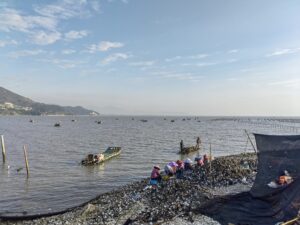John Li ’24 Researches Fisherfolk Communities in Shenzhen, China
Shenzhen is a city known for being an overnight metropolis. The city has experienced rapid urbanization since the 1990s which has affected communities in numerous ways. The effect of urbanization on fisherfolk communities in Shenzhen is what John Li ’24 spent his summer researching using a grant from the Karen and David Thomas Urban China Teaching and Research Endowment. Li is a current senior and a double major in History and International Studies with a concentration in Global Studies.

The inspiration for the project was Professor Alejandrino’s class on Chinese Environmental History. The class exposed Li to an unfamiliar area of study and helped him examine cities from a new perspective. Chinese Environmental History helped Li look at the issues of urbanization from an environmental perspective, which he had not covered in his studies in China or at Trinity. He knew he wanted to pursue this topic further, and Shenzhen, his hometown, was the perfect place to conduct this research. With advice from Professor Alejandrino, they “decided to look at [his] hometown, Shenzhen because it is one of the most rapid urbanized cities in the last 40 years”. As Li began to explore the topic, reports on recessions in the fishing industry caught his attention.
Shenzhen is currently a hub for commercial fishing, but Li wanted to know “Where did all these fisherfolks go? How are they marginalized?”. These questions about the fisherfolks in Shenzhen drove his research. Li spent much of his time looking in the archives in Shenzhen. He found Gazetteers, which provide detailed reports for areas in the city, to be the most helpful in his research. These reports, especially those focusing on coastal villages, had incredibly detailed information, down to the number of fish caught and records of boat sales. This detailed information helped Li piece together how urbanization and recessions in the fishing industry affected the community over time.
He faced some challenges during the research process, one being access to primary source materials. Due to the firewalls in place to protect the documents online, Li had difficulty accessing the primary source materials from the United States, forcing him to rely heavily on the copious notes he took while researching. However, the process of compiling these notes helped keep him focused on the material and attentive to the larger goal of the research.

Despite this challenge, he learned a lot about the political effects urbanization had on the fisherfolk community in Shenzhen. Through his research, Li found that for the fisherfolks the environmental, “damage was so vast and was so great . . . they actually lost their economic way to fight against all these policies before they realized the harm it has caused”. The fisherfolks were not able to advocate for themselves when the city was changing so rapidly around them. In addition, the next generation leaving traditional fishing jobs for more modern work in the city hurt the community. These themes repeated in Li’s research helping him to create a more complete story of fisherfolks in Shenzhen.
Currently, Li is working on a double thesis for History and International Studies using the research he conducted over the summer. Not only was Li able to use his summer research project for his senior thesis, but the application for the Center for Urban Global Studies summer research grant helped him with his thesis proposals. Li says the grant application process “was super helpful and it is always helpful to plan ahead” when working on projects of this size.
Li was able to take his interest in Chinese Environmental History with Professor Alejandrino and turn it into a year-long thesis with his summer research. He is thankful for the opportunity and now has a deeper understanding of how Shenzhen’s urbanization has impacted the fisherfolk community. John Li’s summer research experience helped him enhance his research skills and allowed him to look at his home city from a new perspective.
